Lucy Winthrop was a woman who knew how to get things done in the male-dominated world of the English Puritans. She was born into the aristocratic society of her parents, Sir Adam Winthrop, Lord of the manor of Groton and Anne Browne on January 9, 1601. History remembers her colorful letters and strong, sparkling personality, but Lucy’s most important accomplishment might be her influence in the founding of Harvard.
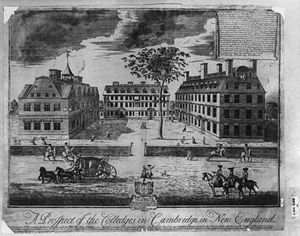
Lucy married Emanuel Downing, a barrister of the Inner Temple in 1622. She was a pious Puritan, but still enjoyed the life of a lady during her years in London. Lucy’s surviving letters and actions made her priorities clear: her eldest son George was her most important child. His education and career reigned supreme in her life, and she probably rivaled the most determined helicopter mom of the 21st century. Unfortunately, Lucy lived to see her folly and learned that with favoritism came its sister ‘Regret’.
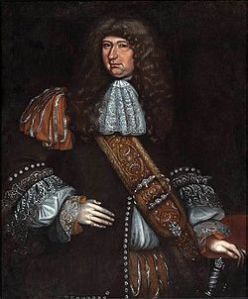
Sir George Downing
The serious and staunch Puritans lamented the tarnished moral state of colleges in England during the 1630’s. The well-educated who wished to follow their families and colleagues to the Massachusetts Bay Colony were presented with a dilemma. New England had no college, but the English universities were rife with “raucous behaviors and frivolities.”
There were no suitable institutes of higher learning for the Puritans on either continent, but Lucy was not about to allow this obstacle prevent her family’s immigration to the Americas. Lucy began a campaign to encourage the founding of a college in New England for her most esteemed son George. Her cherished brother, John Winthrop, was the first governor of the colony and surely had significant influence.
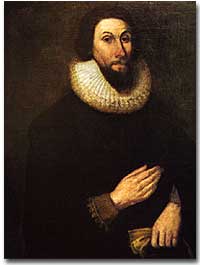
Governor John Winthrop
Winthrop had written many letters to the Downings encouraging them to immigrate. Emanuel represented the Massachusetts Bay Colony before the Privy Council in London on behalf of the colony, and so had knowledge about the opportunities and risks concerning a move to America. Lucy wrote to John about the fearful stories she had heard about life in the colonies: “…many good people here and some that understand New England reasonable well, both by sight and relations of friends, that are able to judge, they do much fear the country cannot afford subsistence for many people, and that if you were not supplied of incomes from hence, you lives would be very miserable…” A skilled negotiator such as Lucy Downing knew she should not appear overly optimistic about such a huge endeavor as a move to the Americas.
In the summer of 1636, John Winthrop increased his efforts for the Downings to join him and his family in New England. Lucy had the keen sense that her influential brother could remove the one barrier that kept them from moving. She wrote a letter to John. “George (her son) and his father comply more cordially for New England; but poor boy, I fear that journey would not be so prosperous for him as I could wish in respect that you have no societies…for the education of youths in learning; It would make me go far nimbler to New England if God should call me to it than otherwise I should, and I believe a college would put no small life into the plantation.” Lucy wanted a college for George!

It cannot be a mere coincidence that in late October 1636 the General Court of Massachusetts agreed to allot £400 to establish a school or college in Newtown, which would later be called Cambridge. The legislature and learned Puritans were fearful “to leave an illiterate ministry to the churches when our present ministers shall lie in the dust.” John Winthrop, as the highly esteemed founder and governor of the Massachusetts Bay Colony, must have exerted significant influence on behalf of the Downings who had already invested in land and livestock in the colony.
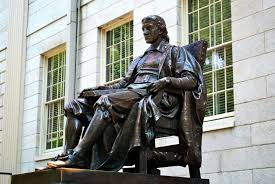
Statue of John Harvard
John Harvard considered one of the founders of Harvard, bequeathed the infant seminary £780 and 400 scholarly books from his library upon his death in 1638. The grateful legislature named the new school “Harvard.” Since Harvard had already been founded two years prior to this gift, John Harvard was not truly a founder but a generous benefactor. Lucy persistence and pressure on the importance of a college in the new colony had to be more than a matter of chance. No other individual’s names are attached to the impetuous to build the colony’s first institute of higher learning. The decision came from the Great and General Court of the Massachusetts Bay Colony, of which John Winthrop was a member.

With the news of suitable educational opportunities in New England, the Downings set sail on the Thomas and Francis in 1638. As educated Puritans, they were impressed with the learned and pious men already in the Massachusetts Bay Colony but were likely concerned about the deprivations of colonial life. The Downings left behind their stately London home and summer residence filled with maids and the luxuries expected by the elite for the more primitive accommodations and treacheries in the new colony.
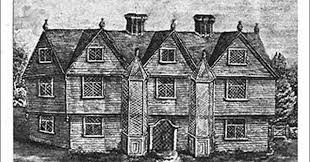
The Downing’s House on Essex Street in New England
The Downing family lived with Lucy’s brother John until they erected a house on three hundred acres of land in what is now Peabody. They called this plantation “Groton” after Lucy’s English manor. In the summer of 1645, the chimney caught fire while the entire family was away, and the entire house was destroyed. The family moved to a house on Essex Street where they lived until the Lucy and Emanuel returned to England in 1656. Emanuel received an appointment as Clerk of Council of State in Scotland, and they remained there until his death in 1660.
George Downing was a member of the first graduating class from Harvard in 1642 and was second in his class. He was offered a position as Harvard’s first tutor, which was then a prestigious honor. In 1645, he went to Barbados as a chaplain to Sir John Okey’s regiment. It appears he forgot most of his spiritual training after that assignment.
Lucy moved to London after her husband’s death, likely assured she would reap the benefits as the mother of Sir George Downing who was enjoying the protection and privileges from the royal court. Sadly, George treated his mother no better than he did many others. Lucy lived out the rest of her years under the alleged neglect of her most esteemed son. Desperate, she wrote letters to relatives to ask their assistance in petitioning George to increase her allowance as she “suffered in her old age for the necessities of life.”
“I am now at £10 a year for my chamber and for my servant’s wages and have to extend the other £10 to accommodate for our meat and drink, and for my clothing and all other necessaries I am much to seek, and more your brother George will not hear of for me, and he says that it is only covetousness that makes me ask more.”
Lucy’s nephew John Winthrop Jr., Governor of Connecticut, heard of her distress and begged George to “help Aunt Lucy in her time of age and infirmity.” George dismissed the letter insisting he could do no more, although he had already become a very wealthy and influential man. He was Sir George Downing, 1st Baronet and known as a statesman, diplomat, turncoat, and spy. Downing Street in London and New York City are named in his honor.
Two centuries after Lucy’s death, her story came to the attention of Harriet Hanson Robinson, a 19th-century author and suffragette. HHR pitied Lucy’s situation during her old age but commented on this familiar scenario. “Lucy Downing established the unwise precedent of educating one member of her family at the expense of the rest- a precedent followed by too many women of her time.” HHR’s observations were accurate as no other Downing sons were educated at Harvard and her daughters were sent out to service in the colonies. One of these daughters was forced to marry against her wishes, although most of her children married quite well. Lucy died on April 9, 1679, in London.
Lucy’s colorful writing lives on and shows her sense of humor and unique choice of words. The lack of spelling and grammar conventions back then make her letters sometimes difficult to read, but they provide a rare insight into the life and concerns of this educated and well to do Puritan woman who lived on both continents. Although she was a mother to nine children and three stepchildren, her letters to family rarely mention any except George. This omission seems noteworthy considering she left seven of them in the colonies when she moved back to England.
Why didn’t Harvard pay more tribute to any member of the Downing family for its very existence? Lucy, although educated and cunning was still a female and had little authority or observable power. Not only could women not vote, but they were not allowed control over their own money or inheritances. It was a man’s world. Also, Lucy abandoned any influence she may have enjoyed in the colony when she had her husband returned to England.
The most likely reason for Harvard forgetting the Downing’s influence is that Sir George Downing, one of its first graduates and its first tutor, was held in very low esteem by the colonists after he returned to England. First siding with Cromwell, George switched his allegiance back to the king when the crown was restored. This was remarkable since George gave his full allegiance to Cromwell, but showed the skill of currying favor with those in power throughout his political career, even if it meant traitorous behavior.
George blamed his time with Cromwell on his teachers at Harvard and the elite back in the colonies for their ill-conceived ideas and teachings. Word of this traitorous and disloyal behavior reached the colonies and George was forevermore held in disdain. It became a proverbial expression in New England to refer to a false man who betrayed his trust as “an errant George Downing.” Harvard had little reason or incentive to honor Sir George Downing or his mother, Lucy Winthrop Downing.

Lucy’s father, Sir Adam Winthrop
The historical novel, In the Shadow of Salem, is the story of Mehitabel Braybrooke Downing, Lucy Downing’s daughter-in-law. It is available on Amazon.
Wow! How wonderful to have this info about one of my ancestors! Thank you so much!
Gayle Lembcke
LikeLike
Excellent life sketch of Lucy Downing! I descend from her son John, b. 1640.
Most people, including Harvard folk, consider the founding mother of Harvard College to be (wait for it….)
Anne Marbury Hutchinson.
Hutchinson’s two trials, in 1637 and in March 1638, wherein she defended herself and frustrated John Winthrop, Thomas Dudley, Rev. John Cotton and Rev. John Wilson, and the best theological minds of their theocratic government, showed up the need for a seminary to teach future ministers of the colony. Yea, even ministers who could silence an uppity woman! No, Anne didn’t push for a college, but she seemed to scare the daylights out of MassBay Colony at just the right time.
Maybe Lucy and Anne, though on opposite sides of the fence politically and theologically, were co-founders of higher education.
LikeLike
Lucy was my step great-grandmother. I am descended from Emanuel Downing’s first wife Anne Ware, who died young. My guess is Anne was another brilliant soul.
My family is full of strong and often very funny women long before strong women were cool.
Gen WT Sherman and his brother Secretary of State John wrote in their autobiographies about a loving taskmaster grandmother Betsy Stoddard.
LikeLike